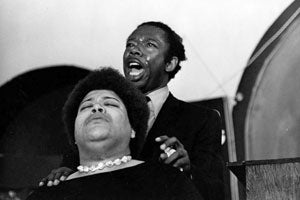The protagonist in As Above, So Below is Jita-Hadi, a marine who has recently returned to the U.S. from fighting in Vietnam. Jita-Hadi meets a woman in a cafe and recounts his experiences in the military to her. Jita-Hadi explains that he was forced to aid the U.S. in oppressing two social uprisings, one in the Dominican Republic, and the other in Vietnam. Jita-Hadi was politically opposed to both military actions and serving in them helped form his political consciousness.

The character of Pee Wee serves as a foil to Jita-Hadi, he has blind faith in the system. Pee Wee is eventually shot down by police while trying to inform on militants in the neighborhood. Clark is making a stark and clear statement that believing in the system isn’t going to save you from its corruption. One must fight the system to see change.
The theme of blindness or blind faith reoccurs in Clark’s piece during a church service. The service is larger than life and a little absurd. When the service ends the preacher is replaced by a man that pressures the congregation donate the heftiest sum possible to the collection plate. The man lets the parishioners know that the more money they donate the better and that loose change is an unacceptable offer. Similar to Pee Wee, the churchgoer’s indiscriminate faith in the system is leading them to be essentially robbed by the church.
As Above, So Below is both a call for people to open their eyes to the world around them and a call for action over passivity.
—Moana Sherrill






 Mobile Navigation
Mobile Navigation


Comments